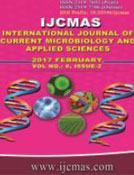


 National Academy of Agricultural Sciences (NAAS)
National Academy of Agricultural Sciences (NAAS)

|
PRINT ISSN : 2319-7692
Online ISSN : 2319-7706 Issues : 12 per year Publisher : Excellent Publishers Email : editorijcmas@gmail.com / submit@ijcmas.com Editor-in-chief: Dr.M.Prakash Index Copernicus ICV 2018: 95.39 NAAS RATING 2020: 5.38 |
A field experiment was initiated in established Robusta coffee plantation with different levels of drip fertigation viz., 75, 100, 125 and 150% of recommended dose of fertilizers to study the influence of micro-irrigation and drip fertigation on yield and yield parameters of coffee at Central Coffee Research Institute. Results showed that drip fertigation with 125 % recommended dose of fertilizers recorded significantly higher bearing nodes per branch (24.87) and pin heads/branch (623.29) which was on par with treatment having drip fertigation of 100 % of recommended dose of fertilizers (23.42 and 600.13 respectively) and 75 % of recommended dose of fertilizers (23.12 and 591.42 respectively) over the control. Similarly, significantly higher clean coffee yield (1008 kg/ha) was recorded in the treatment with 125 % recommended dose of fertilizers drip fertigation and it was on par with the treatment received 100 % recommended dose of fertilizers through drip fertigation (960 kg/ha) which was followed by 75 % recommended dose of fertilizers through drip fertigation (671 kg/ha). Higher grade quality (“AB”) bean percentage was observed in the treatment with 100 % recommended dose of fertilizers through drip fertigation (61.62%) where as treatments received 125 % and 75 % recommended dose of fertilizers through drip fertigation recorded 59.26% and 58.14% respectively. Hence, the adoption the drip fertigation in coffee estates could increase productivity of coffee more than half as compared to coffee cultivated under conventional irrigation system.
 |
 |
 |
 |
 |